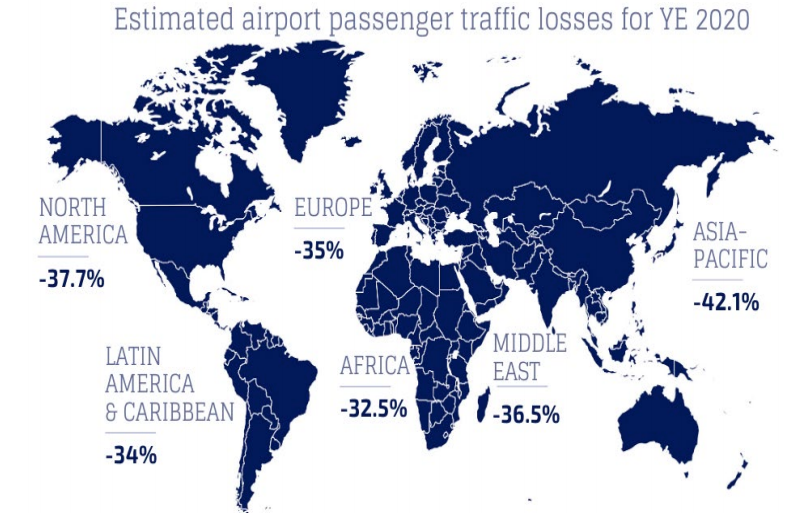INTERNATIONAL. Airports Council International (ACI) World today published a policy brief for regulators, outlining the key measures required for the airports industry to recover from the COVID-19 pandemic.
Among the initiatives suggested is that governments permit an increase in duty free allowances for travellers after the crisis passes. This, said ACI, “will result in increased sales for airport retailers, benefiting the airport ecosystem overall”.
The policy brief – titled COVID-19: Relief Measures to Ensure the Survival of the Airport Industry – aims to provide policy-makers with a “toolkit of solutions” to ensure that airports can be sustained through the crisis and lay the foundation for recovery.

“The impact of COVID-19 on the airport sector has been profound”, noted ACI. Passenger traffic is expected to decline by almost -40% and revenue is expected to contract by US$77 billion in 2020. To alleviate the impact, ACI World has issued the following six policy responses that should be implemented:
- Protection of airport charges and revenues: as airports will need to ensure the continuity of basic services, they must continue to charge users, said ACI., Therefore alleviating the collection of airport charges through suspension or blanket discounts is “ill-advised”, it urged;
- Tax relief: urgent tax relief will provide much-needed “financial oxygen” to airports to ensure continuity of operations and safeguard airport jobs; within this falls the proposal to increase duty free allowances;
- Concession fee waiver: airport rents and concession fees should be waived or postponed in the form of a one-time measure for a defined period;
- Temporary suspension of slot usage requirements: airport slot usage requirements should be suspended, at global level, until 30 June 2020 with a reassessment of the situation based on data-driven evidence to follow;
- Continuity of air cargo operations: airports should continue levying charges on air cargo operations to maintain essential airside and cargo facilities;
- Comprehensive financial relief: this should include wage subsidy schemes to allow continued operations and a rapid return to full operations. Grants and subsidies, secured financing, loans at preferential rates, and bank guarantees should be made available. Financial relief should be non-discriminatory and not benefit one actor at the expense of others in the aviation ecosystem.

“Airports are important engines of economic growth, wealth creation and employment and the COVID-19 pandemic’s effect on the industry and broader economy has halted the airport industry at global level,” said ACI World Director General Angela Gittens.
“Passenger traffic has collapsed but many airports are open for some scheduled operations, humanitarian and repatriation flights, and cargo operations and these activities continue to induce costs for airports. The millions of jobs provided by airport operators must be preserved and essential operation must be sustained in the most effective way to allow for these crucial operations to continue and for the foundation to be laid for a rapid recovery.
“The relief measures that have been put forward will ensure that financial assistance does not benefit one part of the industry over another in the aviation ecosystem so that a balanced, global recovery can be created.”
ACI noted that the crisis will continue to have “far-reaching economic ramifications”, and that the impact will extend not only to the second quarter of 2020 but also to the second half of the year.
“Most experts in the air transport industry agree that the prospective recovery may take at least a year and a half to reach pre-crisis traffic levels. That is, we may not see pre-COVID-19 traffic volumes again before the end of 2021.”
The Policy Brief – COVID-19: Relief Measures to Ensure the Survival of the Airport Industry is available free of charge on the ACI World website.











